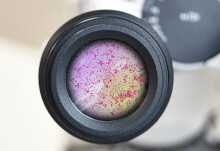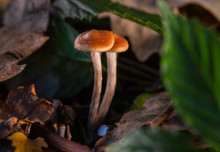

Students and staff mark the launch of Imperial's Centenary year - <em>News Release - 30 January 2007</em>
For immediate use
Tuesday 30 January 2007
One hundred years of invention and innovation are celebrated today with the official launch of Imperial College London's Centenary year.
A range of events will take place across Imperial's nine campuses, ending with a lecture by Rector Sir Richard Sykes that will explore Imperial's historic achievements and look at what the next 100 years might hold. He says:
"Imperial has stayed remarkably true to its core ideals, its founding principles, to advance scientific endeavour and apply it to find solutions to the world's challenges. As we move into our second century and beyond, I have no doubt that wherever there are major breakthroughs there will be an Imperial scientist very close by."
The Centenary year celebrates Imperial's continuing contribution to society through research that tackles national and global challenges. Over the last 100 years, achievements of Imperial researchers include discovering penicillin, developing holography, inventing fibre optics and designing the Maglev railway.
This tradition continues today, with current research focusing on measuring and tackling problems caused by climate change; finding low-polluting ways to meet future energy needs; consigning tropical diseases to history; and modelling the spread of infectious diseases such as avian flu to minimise the impact of any outbreak. Recent breakthroughs include the demonstration of the world's first 'invisibility cloak' by Sir John Pendry and partners at Duke University, and the development of anti-TNF drugs by Professors Ravinder Maini and Marc Feldmann, which have changed the lives of thousands of rheumatoid arthritis sufferers worldwide. Sir Richard adds:
"Universities are in the ideas business and we are judged by the brilliance and quality of the ideas coming out of us. Imperial has always specialised in addressing tomorrow's needs as well as today's, through our staff and also through the 140,000 students we have so far educated. As we face the natural and man-made challenges of the twenty first century, I am confident that many of the answers will come from the innovative, multi-disciplinary work at which we excel."
In a day that will celebrate a century of both academic achievement and community life, students will release 500 balloons and exhibit the Union's mascot cars, a 1916 fire engine and a 1902 James and Brown car. They will also run tours of the Queen's Tower, the 287 foot bell tower that stands at the centre of the College's South Kensington campus, and put on displays of juggling, skating and music.
Dining rooms at the College will serve cuisine from a 1907 menu recently discovered in the College archives, offering a three course meal including devilled whitebait and guinea fowl for 30 shillings (£1.50). Centenary wine will be available for one guinea (£1.05) per glass.
The launch will also include the announcement of the winner of Imperial's London Marathon place, which will raise funds for the Student Opportunities Fund, founded in 2003 to provide scholarships for academically talented students.
Today's celebrations kick off a year of special lectures and events including alumni receptions in Hong Kong, Singapore, Australia and Germany, and the College's first overseas graduation ceremony in Singapore.
Sir Richard's Centenary lecture will be streamed live at 6pm today and subsequently available to download at: www.imperial.ac.uk/aboutimperial/events/onlinelectures
Full information about Imperial's Centenary is available at www.imperial.ac.uk/centenary
-ends-
For further information contact:
Abigail Smith
Imperial College London Press Office
Tel: 020 7594 6701
Email: abigail.smith@imperial.ac.uk
Notes to editors:
Imperial alumni include:
- HG Wells, science fiction author
- Rajiv Gandhi, former Indian Prime Minister
- Trevor Phillips, chair of the Commission for Racial Equality
- Brian May, Queen
- Sir Roger Bannister, first man to run a mile in under four minutes
Imperial's fourteen Nobel Laureates include:
- Dennis Gabor, in 1970 for his invention and development of the holographic method
- Sir Alexander Fleming and Sir Ernst Chain, jointly awarded the Prize in 1945 with Sir Howard Florey for discovering penicillin
- Sir Geoffrey Wilkinson, in 1973 for work on organometallic 'sandwich compunds' which led the way for the development of catalytic converters for car exhausts and the use of today's low-lead fuels.
- Lord Patrick Blackett, in 1948 for his development of the Wilson cloud chamber method and consequent discoveries in the fields of nuclear physics and cosmic radiation
- Sir Walter Haworth, in 1937 for his research into the constitution of carbohydrates and vitamin C
About Imperial College London
Rated as the world’s ninth best university in the 2006 Times Higher Education Supplement University Rankings, Imperial College London is a science-based institution with a reputation for excellence in teaching and research that attracts 11,500 students and 6,000 staff of the highest international quality.
Innovative research at the College explores the interface between science, medicine, engineering and management and delivers practical solutions that improve quality of life and the environment - underpinned by a dynamic enterprise culture.
With 62 Fellows of the Royal Society among our current academic staff and distinguished past members of the College including 14 Nobel Laureates and two Fields Medallists, Imperial's contribution to society has been immense. Inventions and innovations include the discovery of penicillin, the development of holography and the foundations of fibre optics. This commitment to the application of our research for the benefit of all continues today with current focuses including interdisciplinary collaborations to tackle climate change and mathematical modelling to predict and control the spread of infectious diseases.
The College's 100 years of living science will be celebrated throughout 2007 with a range of events to mark the Centenary of the signing of Imperial's founding charter on 8 July 1907.
Website: www.imperial.ac.uk
Article text (excluding photos or graphics) available under an Attribution-NonCommercial-ShareAlike Creative Commons license.
Photos and graphics subject to third party copyright used with permission or © Imperial College London.





